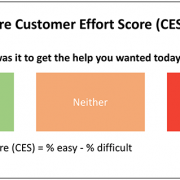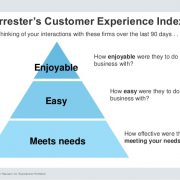Why the voice is still the preferred form of contact?
 Although many companies believe that providing better customer service is vital, there is a gap between saying and doing. A recent investigation by Forrester states that 95% of leaders consider good customer service a priority, while another report, also from Forrester, shows that only 31% of organizations closely monitor the quality of interactions with their customers.
Although many companies believe that providing better customer service is vital, there is a gap between saying and doing. A recent investigation by Forrester states that 95% of leaders consider good customer service a priority, while another report, also from Forrester, shows that only 31% of organizations closely monitor the quality of interactions with their customers.
In other words, for many it is important, but at the moment of putting it into practice, the picture changes. This contrast is also evident in our market. Part of the problem is what is meant by good customer service.
For example, investing in an omnichannel strategy is an important corporate trend. Companies look for web self-service, instant messaging and almost any other method they can find to offer a better customer experience. But while all these channels can be useful for retaining customers and building loyalty, many brands are neglecting the most important customer channel they have: the telephone.
Despite the attempts by companies to encourage customers to contact them in other ways, most consumers still rely on the phone when requiring service.
The same Forrester studies confirm that the telephone is still the most used customer service channel, with 69 percent of consumers calling a call center. And when customers are upset, they are even more motivated to pick up the phone. In fact, customers are 11 times more likely to complain on the phone than through the Web.
Therefore, the telephone is still the most used channel and, ultimately, the most important one for customer service. And as we have seen, any corporate executive knows that service is important.
Could it be that a large amount of current investment in customer service goes to the wrong place? Omnichannel strategies can produce results to some extent, but there is still no successful replacement for a call center that provides superior customer service. Agents with excellent communication skills who can empathize with customers, are more valuable than ever.
One problem is usually that agents often feel powerless to help customers. They fail to build the kind of solid relationship that will ultimately provide a more rewarding experience. The tools available help them capture data and remain compatible, but in reality they do not help them to improve their dialogue with customers. As a result, the latter feel that they are talking to someone who is apathetic to their needs.
Agents are often afraid to talk to customers because they know that frustrated customers will treat them as obstacles and not as facilitators. And on the other hand, supervisors face significant measurement challenges.
These challenges touch on one point: emotional intelligence. That’s why people prefer the voice, because they want to talk, they want to interact with the emotions of the voice. At TecnoVoz we believe that emotional intelligence leads to a notable improvement in the performance of the customer experience.
Companies that can successfully measure and improve the Emotional Experience will find that they have a unique competitive advantage over their peers. Recent advances in technology can play a key role in analyzing conversation patterns, determining the quality of an interaction and providing real-time guidance to agents so they can show empathy, build relationships and create valuable emotional connections.








